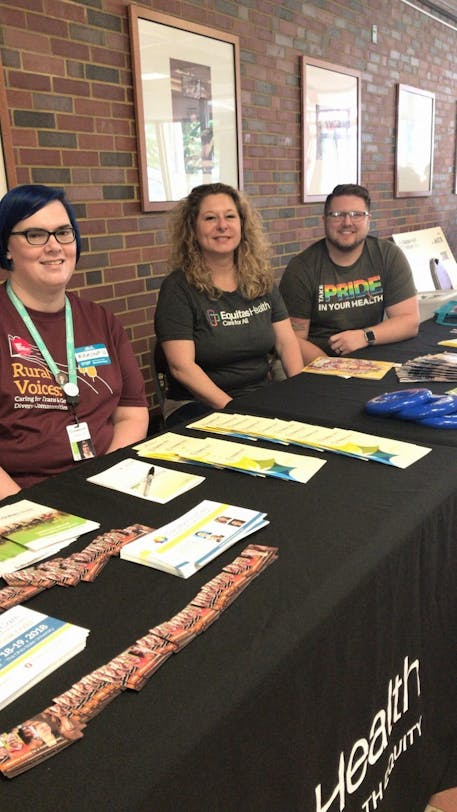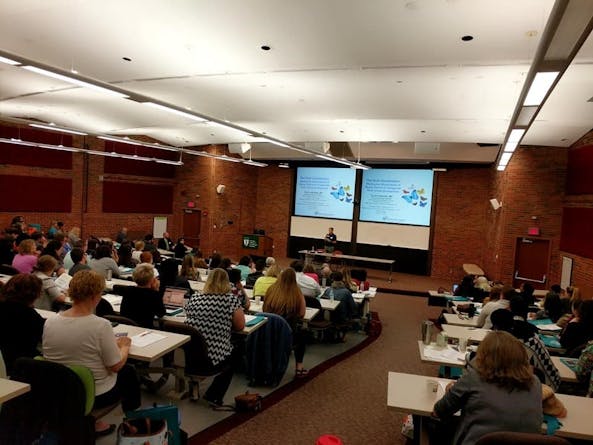The Rural Voices Summit is a conference that will bring together students, faculty, community members and healthcare workers to focus on the needs of transgender and gender diverse individuals in rural areas.
The conference will be held via Zoom on Friday, Feb. 26 and is a collaborative event hosted by the Ohio University LGBT Center, Equitas Health, the Heritage College of Osteopathic Medicine, TransOhio and the Southeastern Ohio Rainbow Alliance (SEORA).
The event will consist of various panelists and a keynote address from psychologist Maureen Osborne. Students who attend will also be eligible to apply for select scholarships. The conference is typically held every two years, but had to be readjusted to accommodate COVID-19 restrictions.
Cory D’Ambrosio is the education manager at Equitas Health Institute, which is the “education and research arm” of Equitas Health. D’Ambrosio explained that the structure of the conference will include various panelists that will share their experiences, followed by audience participation and discussion.
“We really want to facilitate learning and shared experiences through this event,” D’Ambrosio said. “We want to make sure we are helping to build capacity in areas to ensure that people understand how to best serve transgender and gender diverse folks, and that we are giving them the best tools to do so.”

The 2018 Rural Summit provided via Cory D’Ambrosio.
Jan Huebenthal, assistant director of the OU LGBT Center, said the purpose of the event is to recognize the prominent inconsistencies that transgender and gender diverse communities experience in regard to their healthcare.
“We know through research that transgender people in rural areas face significant health disparities, particularly in their access to healthcare,” Huebenthal said. “This could be that there is no doctor perhaps in their community, or even if there are healthcare providers, there's a lack of knowledge and a lack of cultural sensitivity that trans folks often encounter, which can lead to discrimination.”
Luvina Cooley, a sophomore studying anthropology, is the communications coordinator at the LGBT Center. Cooley will be a panelist at the Rural Voices Summit. Through her experience, Cooley knows there’s a cultural insensitivity that is prevalent in medical settings.
“In my experience, I've dealt with providers who aren't hostile to me, they're just not knowledgeable because they haven't had the experience with it,” Cooley said. “And so a lot of what I've had to deal with is, in a way, educating my providers, and I think being able to let the providers know, this is what this demographic is needing from you is really helpful.”
Delfin Bautista, communications director and interim secretary at the SEORA, helped create SEORA to properly assist the LGBTQ community in southeastern Ohio.
Bautista, who uses they/them pronouns, said the marginalization that transgender individuals experience has been historically high, even among fights for equality for the rest of the LGBTQ+ community.
“For a long time, trans identities and issues were neglected by the wider LGBTQ equality movement,” Bautista said. “There is a lot of catching up that needs to happen as well as the need to center the experiences, needs, concerns and resiliencies of minoritized communities within the LGBTQ community.”
By sharing their experiences through this event, Bautista said that it will raise awareness of healthcare needs for trans individuals, which are traditionally structured to be exclusive to cisgender people.
“Part of the conference is to help increase access to inclusive resources in a region where resources for our community are limited,” Bautista said. “Finding trans and queer affirming providers is a challenge; not just in terms of accessing services related to medical transition, but also for general healthcare needs. The goal is to increase access to trans-inclusive services as well as increase trans-specific services.”

Through attending conferences like Rural Voices that focus on the trans experiences in healthcare, D’Ambrosio stated that there has been progress in how some providers utilize the knowledge that they have gained.
“One of the things that we often see is really basic pieces like introducing themselves with their pronouns,” D’Ambrosio said. “Oftentimes they build up that skillset, and when they introduce themselves to their patients, they are offering their pronouns and taking the steps to include something simple like that to be more inclusive and welcoming.”
For both the providers and the students that attend the conference, Huebenthal said it will be widely beneficial to understand the perspectives of the trans and gender diverse individuals, and work to create a more inclusive environment for them.
“The project of inclusion and of making a diverse world does not end with the healthcare field, it's really up to each of us to make that world,” Huebenthal said. “The more we can all open our eyes to the difficulties and the discrepancies and the disparities, I think the better we are all equipped to make that a reality.”






